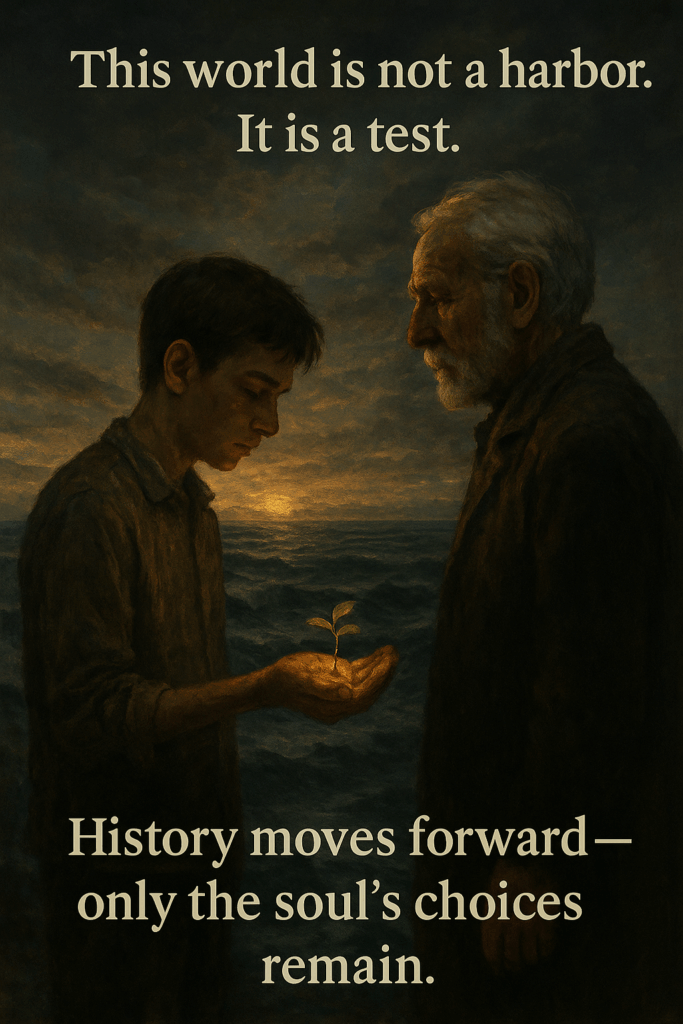
The night deepened, the lamplight steady against the dark. Emil sat across from his grandfather, the words from earlier still echoing: “A leader who lives in the past will burn the present to reclaim it.” He could not let it rest. His brow furrowed, he finally asked, his voice quiet but insistent.
“Grandfather… why did you say this? What makes a person destroy their present just to chase what’s already gone?”
The old man folded his hands, his gaze far away, as though seeing not just Emil but the long procession of human history itself. His answer came slowly, as if measured against eternity.
“It is Absence One, Emil—the forgetting of life’s design. When a people forget why they were created, they mistake the harbor for the home. They imagine this world is permanence, when it was built as a test. They forget that God, when He made Adam, gave humanity freedom and intelligence —not as a curse, but as the only soil in which virtue can grow.”
He leaned closer, his eyes bright beneath heavy lids.
“When the angels questioned God—‘Will this creature not shed blood?’—He did not deny it. He affirmed the risk. For virtue without freedom is no virtue at all. Goodness only shines when evil could have been chosen instead. And so, this life is not a game of perfection—it is the trial of refinement. To reveal who, when given freedom, will choose mercy over vengeance, justice over cruelty, compassion over indifference.”
Emil turned his cup in his hands, the thought pressing against his heart.
“So those who are shedding blood —they are not only fighting nations… they are fighting God’s plan itself?”
“Exactly,” the grandfather said, his voice low and firm. “When history has moved on—when conquest has been judged and discarded, when humanity has outlawed the old brutalities—they burn the present to try to reclaim the past. They are clawing against the tide of God’s historical process, which no tyrant can truly reverse. Their rage comes from terror: terror of impermanence, terror of accountability, terror that their power is only a test they might fail.”
He paused, then spoke with a gentleness that cut deeper than anger.
“This is why wars flare—not only for land, but for the fury of impermanence. Why tyrants cling to power—not for governance, but from fear of their own trial. Why hearts break—not only at loss, but at the demand that they accept this world is transient. They mistake the test for permanence, and in doing so, they set fire to what little time they have.”
Emil’s confusion began to loosen, like a knot slowly untangling. He saw the pattern:
-
Wars ignited not just over soil, but over denial of life’s impermanence.
-
Leaders burning cities because they could not accept that history had moved past conquest.
-
Ordinary people crushed, not just by loss, but by the illusion that permanence could be seized by force.
Grandfather’s voice softened into something like prayer.
“Always remember, Emil: pain will pass. Blessings will change hands. Only your response echoes eternally. When you hold power, your test is truth. When you see suffering, your test is compassion. Every selfish choice corrupts the soul, every just choice sharpens it. God has given freedom—and with it, He watches the responses. The harbor is not here. The permanence lies beyond. Until then, every storm is only a question placed in your hands.”
The clock ticked in the silence that followed. Emil looked at his hands, roughened with soil from the greenhouse, and for the first time he understood: the test was everywhere. Not in perfection, not in permanence, but in each small decision to protect, to preserve, to plant. He began to see that no better world could have been fashioned by God for this sacred purpose of testing humanity.

